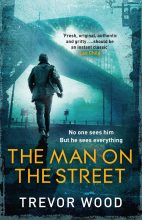The Man on the Street by Trevor Wood
What led you into writing?
I was in the Royal Navy for 16 years and when I left I retrained as a journalist, doing an NCTJ Journalism course in Darlington. It was mostly young, post-university graduates so the other older trainee, Ed Waugh, and I were the only ones commuting from the Newcastle area so we started car-sharing and talked a lot about our shared interest in comedy writing. Several years later, after we both became bored with journalism, we decided to give it a go. Within five months of sitting down together for the first time our debut stage play, Good to Firm, was given its professional premiere at the Customs House theatre in South Shields. Our second play, Dirty Dusting, was a big hit, going on to do several national and international tours and is still touring now and we never really looked back from there. After ten hits we decided to explore some solo projects and my love of crime novels eventually led me to do the inaugural MA in Creative Writing (Crime Fiction) at UEA in Norwich. My debut novel The Man on the Street is a product of that course.
How does a typical day look?
I try to treat writing as a normal job so I like to be sat at my desk working from around 9am and I try to finish around 5pm, Monday to Friday when I stop to start preparing the evening meal for my family. Doing all the cooking is a reasonably quid pro quo for working from home while everyone else has to go out to make a living. As it’s such a sedentary, solitary working life, I do take breaks to go for a run or to the gym at least three times a week. It’s either that or resign myself to an ever-growing waistline and expanding backside.
In what ways do your characters test your abilities
I never know what they’re going to do next as I’m not a plotter so I’m often taken by surprise. I regularly have to go back to earlier chapters and retro-fit a new plot to explain their actions. It’s deeply annoying but I figure that if I don’t know what they’re going to do next it’ll be very hard for a reader to anticipate it.
What’s your setup?

A very straightforward small study which overlooks the street so I get to see what all the neighbours are up to. It also means I’m the parcel keeper for the street as every delivery man sees me sitting there and I can’t pretend I’m not in. I’m occasionally joined by one of my cats but mostly they prefer a bedroom of their own.
What lasting effects have your favourite authors had on your writing and style?
I’m much more interested in characters than plot and therefore particularly like crime books that focus as much on relationships as anything else. Dennis Lehane’s Kenzie and Gennaro series is probably my favourite as I love the realistic way their relationship ebbs and flows through the years and I try very hard to reflect that reality: that relationships are an ever-changing thing. As a one-off piece of advice though, I think that Elmore Leonard’s tip to ‘leave out the parts that readers tend to skip’ is about the most important thing a crime writer needs to know.
What do you do for inspiration?
Music is a big inspiration for me. The working title of The Man on the Street was When A Fire Starts to Burn – a song by Disclosure. The pitch I used for the book when trying to attract attention from publishers was very loosely based around The Streets’ song Turn the Page and the sequel which I am currently editing is partially inspired by Poem by She Drew The Gun. One of the titles I suggested for the sequel was Dead Boys, a song by Sam Fender though, sadly, it didn’t make the cut.
Whenever I’m stuck though, or not sure how to move the story on, I go for a run. I really find it helps me to generate new ideas and, as an added bonus, thinking about the plot makes me forget how little I actually enjoy the running.
What repeating themes do you find yourself pulling into your stories?
Parent/child relationships are the thing that keeps popping up (no pun intended) in my books. The Man on the Street has at least three of them and an unpublished novel that’s sitting in my drawer has another. I guess that once you’re a parent it’s something that you think about a lot of the time!
How do you wind down?
Alcohol, reading and music. And sometimes all three at once. I also still like going to see live bands, which combines two of the three. I’m often the oldest in the room but just saw some research that suggested that doing this adds years to your life so win-win. Aside from that, I play cricket for the splendid Mallards CC – a North East based friendly team that welcomes all players regardless of age or ability, which is a good job where I’m concerned.
What sort of challenges do you regularly overcome while world-building?
The most obvious difficulty for me is that my book is largely set within the homeless community so I try very hard to capture the grim reality of that situation without wallowing too much in the misery. I volunteer for one afternoon a week at a soup kitchen and think that the homeless are mostly demonised and I wanted to humanise them, to show the resilience, fortitude and humour that’s essential for survival in that situation and to illustrate that a lot of the people aren’t there because of some kind of weakness but because circumstances have conspired against them or because of one bad decision, or even bad luck. There seems to be a world-wide shortage in empathy at the moment and I hope that, in a small way, I’m doing something to help redress the balance.
What’s the most useful advice you could give to an aspiring author?
Two connected things. Don’t wait for inspiration to start writing, just write and then write some more. You can edit it later but without words on a page you have nothing. Secondly, find a trusted ally, or preferably more than one and show them your writing. Getting constructive feedback – and the constructive bit is vital – on your work is absolutely essential to growing as a writer. So many people claim to have a novel in their heads or in their drawers but until it’s out in the big wide world and available for people to read you have nothing.
Tell us about the book you’re promoting.
The Man on the Street centres on Jimmy, a homeless veteran, grappling with PTSD, and living on the streets of Newcastle, who witnesses a murder. Initially no-one believes him. and even he hopes it’s another one of his vivid hallucinations but then a newspaper headline catches his eye: GIRL IN MISSING DAD PLEA. He believes the missing man might be the victim of the crime he witnessed.
It’s time for him to stop hiding from the world. But telling the girl, Carrie, what he saw puts him at risk from enemies, both old and new. Jimmy has one big advantage though; when you’ve got nothing, you’ve got nothing to lose.
👋 Hi! I run Author Interviews
As a new writer I found myself itching to contribute to a thriving, creative community, so I made Author Interviews and I've met loads of wonderful people in the process. You can buy my debut fantasy RINGLANDER: THE PATH AND THE WAY from Amazon.


 Audible
Audible

